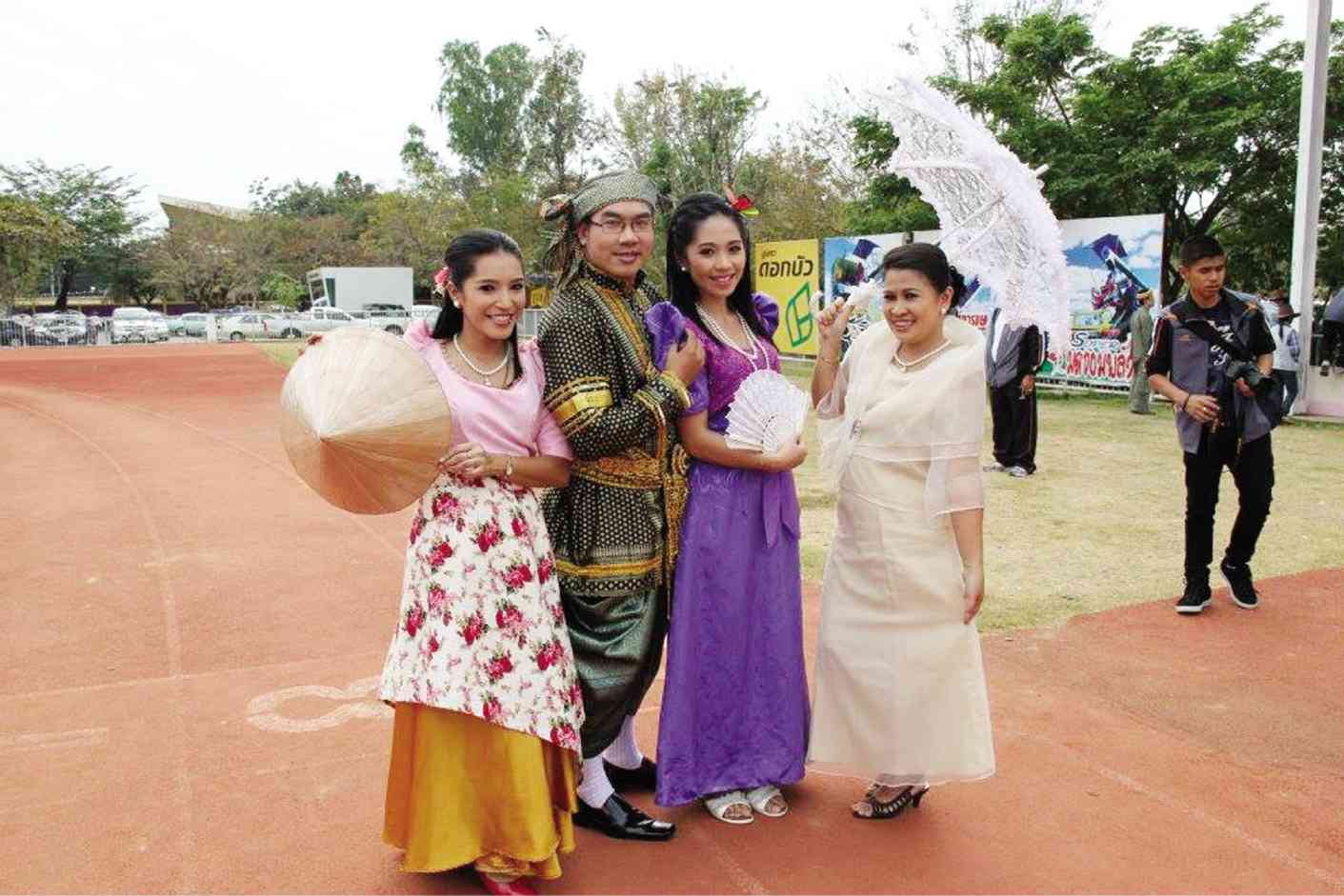
LEAH Doysabas (fourth from right) with other Filipino teachers during Asean Day at the Chalermkwansatree School in Pithsanulok province, Thailand.
It is not certain when the Filipinos learned about the lucrative teaching jobs in Thailand. But there have been Filipinos living in Thailand for many years now.
These are former missionaries or development workers or married to Thais.
Leah Doysabas, a secondary grade teacher in the Philippines has a master’s of science degree in biology. She went to Thailand in July 26, 2003 upon the invitation of a friend who worked as teacher assistant in a school in Bangkok.
She was one of the hundreds of Filipinos who went to the kingdom as tourists but were actually jobseekers in the early 2000.
As of December 2012, there are approximately 16,203 Filipinos in Thailand, according to the Commission on Filipinos Overseas. The Philippine Overseas Employment Administartion (POEA) data shows that the country deployed 8,659 overseas Filipino workers (OFW) to Thailand in 2013, mostly teachers, engineers, production and related workers, composers, musicians and singers.
The 2012 data also show that 3,000 are permanent migrants or married to Thai citizens and more than 11,000 are temporary migrants or workers. However, the numbers could be higher because majority of the Filipinos going there to work entered as tourists.
‘No Filipinos, please’
Doysabas posted her curriculum vitae (CV) on Ajarn.com, a popular site for jobs in Thailand. Ajarn means teacher in Thai. She also applied personally in schools but all she got was either a “Sorry, we don’t hire Filipinos’ or just a plain ‘no.’”
“I was thinking of going home. But I did not even have money to pay for my ticket,” recalls Doysabas.
Teaching with a ‘heart’
After a month, she got a part-time job as an English teacher. She also worked in language centers. Finally in April 2004, Chalermkwansatree School, one of the top government schools for girls in Pithsanulok City hired her as a full-time science, health education and english conversation teacher. She has been teaching there for 11 years now.
In spite of difficulties due mainly to the language barrier, Doysabas enjoys her work in Thailand. Many of her students already graduated and entered universities and oftentimes visit them.
“They said Filipino teachers ‘teach with their hearts’ that’s why they are always remembered by their students,” she says.
Plans to retire
But it was different from the parents.
“At first, parents didn’t want a Filipino to teach their kids then. I’ve worked hard to be accepted,” she says. It came when her students won in various national science competitions.
After a decade of teaching and getting yearly salary increments, a Filipino teacher does not have any retirement benefits. Doysabas still plans to go back and teach in the Philippines three to five years from now.
Being an OFW is not a long-term job, but the opportunity to work here even for a year is a big help to the families back home.
A teaching contract is only for one year and renewable. Citizenship is impossible for them no matter how long they have been in the kingdom. Those married to Thais are given permanent residency status.
From tourist to legal worker
When her father died in 2004, Doysabas returned home. On her way back to Thailand, she was stopped by the immigration official because she did not have an overseas exit clearance. Luckily, there was still a POEA suboffice at Ninoy Aquino International Airport that processed her papers.
Majority of the Filipinos did not go to the usual processing at the POEA. Hence, they are not legal “OFWs” because they are not members of Overseas Workers Welfare Administration. In Thailand, after securing visa and work permit, they become legal workers and are protected by the Thai Labor Laws.
Filipinos whose visas already expired go to neighboring countries, like Laos, Cambodia, Myanmar or Malaysia to secure a 15-day extension or apply for another three-month tourist visa from the Thai Consulate. This is called “visa-run.” Many OFWs who are not given proper documents opted to avail of this.
Paving way to other Filipinos
For three years, Doysabas was the only Filipino at Chalermkwansatree. “Realizing how dedicated and hardworking Filipino teachers are, the school decided to add more Filipinos,” she explains. Currently, there are six Filipinos in the school.
“Filipinos are known for outstanding and commendable characters and work ethics. Filipino teachers have gained respect not just from Thais but other nationalities as well. We may be discriminated at first because we are from a Third World country; our accent they say is funny and we don’t have fair skin and blonde hair. But once they get to know us, Thais will respect, love, treasure and keep us for long,” says Doysabas.
As the southeast Asian region, particularly Thailand prepares for the full implementation of the Asean Economic Community in 2015, Filipino teachers and other professionals are confident that they can compete with other nationalities. Being English speakers, they have the innate ability to adapt to different situations.